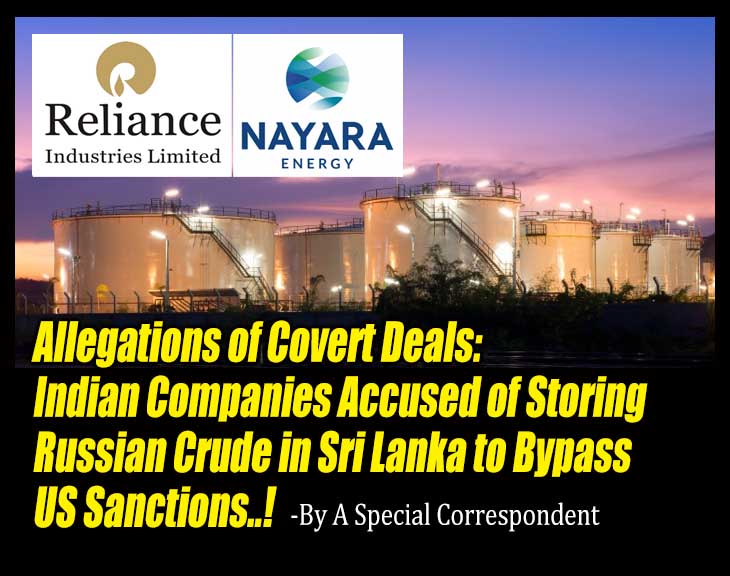-By A Special Correspondent

(Lanka-e-News -11.Jan.2024, 11.45 PM) In a controversial revelation, it has been alleged that major Indian companies, including Reliance and Nayara, are planning to store Russian crude oil in the Trincomalee Oil Tank Farm in Sri Lanka. The move is seen as an attempt to bypass US sanctions on Russian crude and has sparked concerns about the involvement of Sri Lankan politicians with close ties to President Ranil in initiating this controversial venture.
Reliance and Nayara have been identified as the primary buyers of Russian crude, but notable public sector giants such as Indian Oil Corporation (IOC), Bharat Petroleum (BP), and Hindustan Petroleum (HP) have also entered the fray, positioning India as an oil hub for Russian crude. The collaboration aims to utilize Sri Lankan storage facilities for future operations, raising questions about the potential implications of such a strategic move.
The backdrop to this development is the significant role played by Russian oil exports as a vital revenue source for the Russian government's ongoing military actions, particularly in the conflict with Ukraine. The alleged use of Sri Lankan oil storage facilities adds a layer of complexity, as it could provide Russia with a channel to legitimize its oil trade through a neutral country.
Each tank at the Trincomalee Oil Tank Farm has a capacity to hold 12,000 tonnes of fuel, with a staggering total capacity exceeding 1.2 million tonnes. These tanks were originally handed over to India on a 35-year lease by the Ranil Wickremesinghe government on February 7, 2003. The Lanka Indian Oil Corporation (LIOC), a subsidiary of IOC, currently uses 14 of these tanks after refurbishing them at a cost of US$ 1 million per tank. In return, LIOC pays an annual lease fee of US$ 100,000.
While no joint venture was formed initially, the unused tanks remained dormant until recent developments hinted at their potential utilization by Indian companies for storing Russian crude. The involvement of Sri Lankan politicians closely aligned with President Ranil has added a political dimension to the situation.
In 2017, during Ranil Wickremesinghe's return to power as Prime Minister, an attempt was made by his government to lease a portion of the tank farm back from LIOC, but the move proved unsuccessful. Now, with accusations of covert deals involving Indian companies, questions arise about the transparency and legality of such arrangements.
The move to use the Trincomalee Oil Tank Farm for storing Russian crude also raises ethical concerns, given Russia's need for funds to sustain its military efforts against Ukraine. Critics argue that allowing Sri Lankan facilities to be used in such a manner indirectly supports Russia's actions.
In response to questions about the financial viability of refurbishing the tanks, the Minister emphasized a phased approach, indicating that not all tanks would be refurbished at once. He reassured that the cost of refurbishment, pegged at US$ 1 million per tank, is deemed affordable.
As the allegations unfold, the international community will likely closely monitor the situation, assessing the broader geopolitical implications and the impact on diplomatic relations. The intertwined interests of Indian companies, Sri Lankan politicians, and the global energy market present a complex scenario that demands scrutiny and consideration of potential consequences.
---------------------------
by (2024-01-11 18:44:00)
Leave a Reply